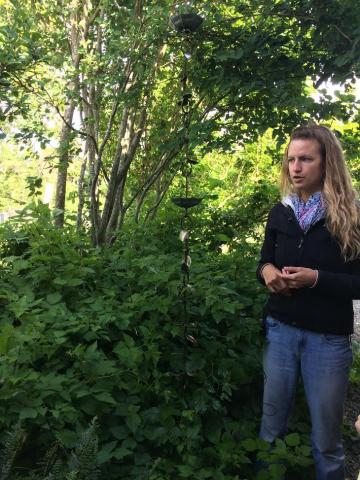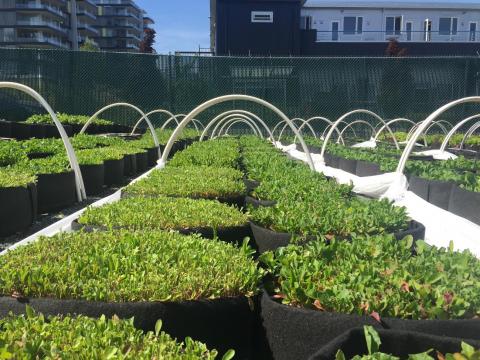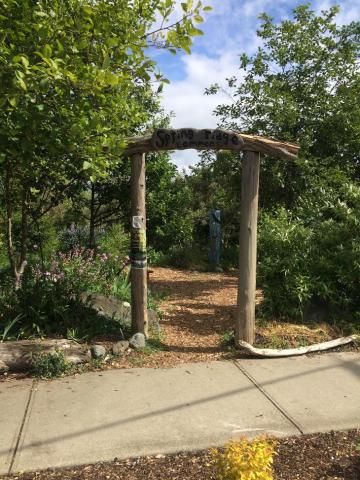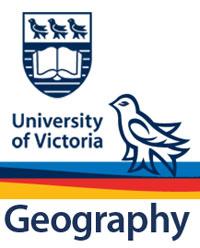Whether it was a walk in the woods with W̱SÁNEĆ poet Kevin Paul, lessons on urban agriculture, or the complex details of implementing bike lanes in the city, we can almost all agree connectivity within the urban environment is vital to sustainability. This became a major theme evident throughout our time in Victoria.
The Cascadia Sustainability school started with a walk through PKOLS, formerly Mount Douglas, with Kevin Paul, a poet and W̱SÁNEĆ First Nation who's family has been on this land since time immemorial. Kevin shared stories of his ancestors, the the history of this land we live on, and battles that were fought here. He taught us that even when fighting for land, people took no more than they needed, an idea that our consumer society sometimes forgets. He told us of language, and why having many names for things allows it to be more than the name that we have given it. Kevin encouraged us that although we may not have a deep history on this land, we should appreciate things as they are and allow ourselves to connect with them without naming and claiming them.
Through city planners and bike activists we learned how important it is to develop an extensive network throughout the city when planning for bike lanes and other forms of active transit. Elements as simple as parking space availability and debates over which streets to use can make what seems like a simple idea extremely challenging. These challenges can be mitigated when everyone involved communicates and understands the positive impacts that removing cars from the road can have. Jayne Bradbury, a real estate developer has found that being able to speak the "language" of business people and understand their wants and needs has been a great help in getting them on board with bike lanes near their stores. Therefore public engagement, outreach, and consultation is crucial to the vitality of a project.  Alysha at the compost education centre showed us the importance of stacking functions when gardening sustainably, once again connectivity plays an integral role. The implementation of compost education and community gardens in the area has taught many people how to sustainably deal with waste, and has given people who love to garden an engaging space to do so. A task as simple as digging and planting in the dirt can serve to connect people to the Earth and to each other.
Alysha at the compost education centre showed us the importance of stacking functions when gardening sustainably, once again connectivity plays an integral role. The implementation of compost education and community gardens in the area has taught many people how to sustainably deal with waste, and has given people who love to garden an engaging space to do so. A task as simple as digging and planting in the dirt can serve to connect people to the Earth and to each other.

Plots at Topsoil
Chris Hildreth, the creator of Topsoil, says that one of the most important aspects of building a successful company is speaking many languages and connecting with many types of people. Chris has learned how to speak to business people, farmers, and restaurants in order to get Topsoil, a zero carbon agriculture business off the ground. When Chris fills a restaurant fridge with his produce, its patrons are contributing to sustainability whether they realize it or not.
 Spring Ridge Commons Spring Ridge Commons in Fernwood is a community run garden aimed at restoring connectivity within the community and to the natural environment. It provides a green space for people to pass by, wander through, or get involved with. The same goes for the Haultain Commons, the first Boulevard garden in Victoria, and the reason why boulevard gardens are legal today. It was the perseverance and mindset of just starting something, that made Rainey, the creator, and Mike Large, a lawyer successful in starting the Haultain commons and legalizing Boulevard gardening. Mike, being a lawyer, was able to communicate to city officials in a language that was meaningful to them as a way of enacting this change. Both Rainey and Mike identified fear of change as an initial obstacle in achieving their vision, but through persistence and community engagement they were successful at creating a "beneficial contagion" - a space dedicated for connecting people to the whole web of life. It was through the commons and a permaculture garden in the area that we learned the phrase "plant a seed in your garden, plant a seed in your community," which reiterates the importance of connectivity not just on a local scale but across communities. Just starting a project like a Boulevard garden is enough to get people asking questions and possibly starting their own. Everyone that we met in Victoria during the first week of the Cascadia Sustainability School 2016 was excited to teach and excited to learn. They planted seeds in our minds to be planted in our own communities.
Spring Ridge Commons Spring Ridge Commons in Fernwood is a community run garden aimed at restoring connectivity within the community and to the natural environment. It provides a green space for people to pass by, wander through, or get involved with. The same goes for the Haultain Commons, the first Boulevard garden in Victoria, and the reason why boulevard gardens are legal today. It was the perseverance and mindset of just starting something, that made Rainey, the creator, and Mike Large, a lawyer successful in starting the Haultain commons and legalizing Boulevard gardening. Mike, being a lawyer, was able to communicate to city officials in a language that was meaningful to them as a way of enacting this change. Both Rainey and Mike identified fear of change as an initial obstacle in achieving their vision, but through persistence and community engagement they were successful at creating a "beneficial contagion" - a space dedicated for connecting people to the whole web of life. It was through the commons and a permaculture garden in the area that we learned the phrase "plant a seed in your garden, plant a seed in your community," which reiterates the importance of connectivity not just on a local scale but across communities. Just starting a project like a Boulevard garden is enough to get people asking questions and possibly starting their own. Everyone that we met in Victoria during the first week of the Cascadia Sustainability School 2016 was excited to teach and excited to learn. They planted seeds in our minds to be planted in our own communities.

